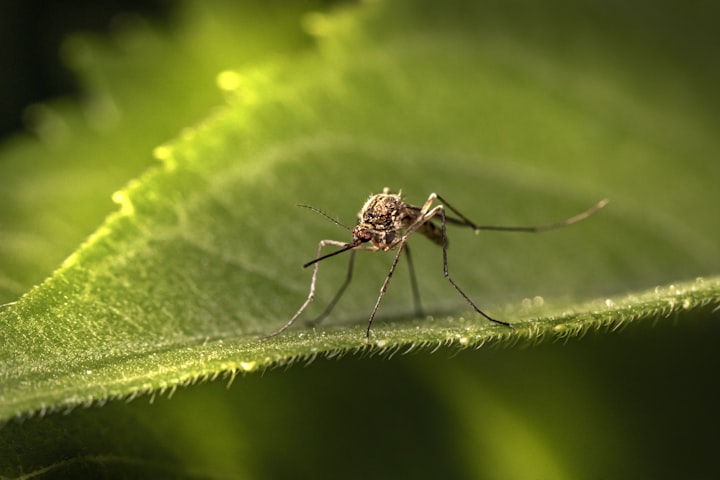Mosquito Mayhem: Unveiling the Epic Saga of Human-Magnet Mosquitoes
From Ninja Assassins to Genetic Lotteries—Decoding the Stealthy Tactics and Secrets of Our Bloodthirsty Winged Foe

Some folks swear they're living under the ominous curse of a mosquito vendetta, as these bloodsuckers seem to have a personal grudge against them, while their nearby pals nonchalantly sip their lemonades, unscathed. But, is this mosquito mayhem merely an illusion, or are these tiny terrors truly picking favorites? And if so, what in the bug-riddled world is going on, and can we thwart their bloodthirsty advances?
Now, let's dive into the enthralling saga of mosquito matchmaking. While their male counterparts contentedly sip on floral nectar like sophisticated cocktail connoisseurs, female mosquitoes, ever the femme fatales, crave a bit more drama in their diet. They embark on daring quests for blood, not for a sinister fashion statement, but to nourish their eggs. It's like they're on a relentless quest for the perfect omelette ingredients.
Flashback to around 10,000 years ago when mosquitoes decided that humans were the ultimate gourmet delicacy. Evolution, always the prankster, led multiple mosquito lineages to develop a sudden fancy for us. As our settlements became more permanent, providing mosquito-friendly amenities like standing water, these relentless bloodsuckers honed their skills at tracking us down like ninja assassins.
Equipped with antennae that could easily pass for a high-end fashion accessory, female mosquitoes boast hair-like appendages adorned with odor-sensing receptors. These sophisticated sensors pick up on the scent signals of their preferred hosts, i.e., us. Over millennia, the mosquitoes that zero in on humans have become the James Bonds of the insect world, mastering the art of covert tracking.
Now, here's where the mosquito sneakiness truly shines. They aim for those hidden nooks and crannies on our bodies, the ones we're less likely to notice. Throw in some sensitivity to visual cues and airflow changes, and you've got a bug that can pull off Houdini-level escapes when we attempt self-defense. They're practically insect escape artists!
Before the close encounters of the itchy kind, several factors play cupid for mosquitoes. Carbon dioxide becomes their initial love note, as they can detect our breath from about 10 meters away. Once they catch wind of our CO2 exhales, they become especially intrigued by dark, high-contrast objects and the captivating hues of human skin. It's like they're on a romantic scavenger hunt guided by the scent of our exhales.
As they follow the carbon dioxide trail, they eventually hit the jackpot of body heat and odors. These odors, courtesy of the microscopic civilizations residing on our skin, are like a delectable buffet for mosquito noses. The more diverse the odors, the more irresistible we become. So, remember, smelling good to mosquitoes is not a compliment in this case.
Things get even weirder (and itchier) when temporary factors kick in. Extra sweat, a dash of alcohol, or a bun in the oven can temporarily turn us into mosquito magnets. Even the Plasmodium parasite, which causes malaria, plays the ultimate wingman by enhancing certain fruity compounds on our skin. It's like a parasite-sponsored fragrance collection designed to make us irresistible.
Now, if you're in the unfortunate 20% deemed as mosquito magnets, you've probably felt like a bug buffet at some point. Blame your skin-specific characteristics. While everyone exhales carbon dioxide and radiates body heat like warm-blooded superstars, it's our unique body odors that seal the deal. With distinct microbial communities on our skin, we each have our signature scent, and mosquitoes have a sophisticated nose for picking up on acidic compounds.
Researchers suspect that certain genes may be behind this mosquito magnetism, influencing the microbial party on our skin. Observations on identical and fraternal twins reveal that mosquitoes play favorites, showing consistent attraction to identical twins while keeping the fraternal ones guessing. It's like a genetic lottery where some of us hit the mosquito jackpot.
But beyond the buzzworthy revelation that mosquitoes are, indeed, conspiring against a select few, there are serious consequences. Mosquito-borne diseases claim hundreds of thousands of lives each year, and resources aren't always where they're needed most. Armed with this knowledge, we can envision game-changing solutions—imagine insect repellents that manipulate our skin's microbiome and odors, turning us into mosquito-repelling superheroes.
Moreover, acknowledging the existence of mosquito magnets opens the door to targeted resource allocation. These chosen ones could receive the bug-fighting arsenal they deserve: repellents, bed nets, vaccines, tests, and treatments. The potential results? A world with fewer itchy bites, broken transmission cycles, and countless saved lives. It's not just about surviving mosquito attacks; it's about thriving and emerging victorious in the eternal battle of man versus mosquito.
About the Creator
Shelby Anderson
I like writing about many things






Comments (1)
Evolution, always the prankster. Close encountereds of the itchy kind. Lol. I love the way you write!